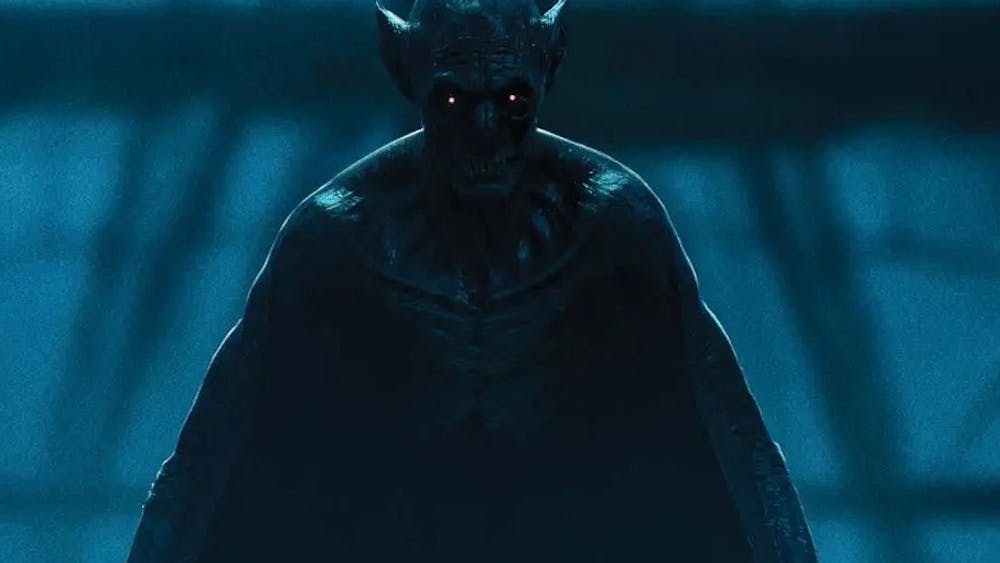Tim Burton's dark remake of "Planet of the Apes" has a considerable amount of potential.\nBut predictably enough, it fails to deliver. \nBurton's conceit is that this surefire blockbuster is a "reimagining" of the 1968 sci-fi classic starring a curmudgeonly Charlton Heston as an ill-fated astronaut. Burton even goes so far as to credit the inspiration to Pierre Boulle's novel in the opening credits.\nThe original Boulle adaptation was a sweeping allegorical epic that inspired serious thought despite its campiness and abysmally low production values. With all manner of special effects wizardry and technological sleight of hand at his disposal, the director of "Beetlejuice" and "Edward Scissorhands" reverses the formula by having nothing to say. \nAs is his talent, Burton creates a brooding, otherworldly backdrop from scratch. But he merely rehashes the ideas of the original in a film that seems half-finished in the most generous judgment.\nReportedly, Burton re-edited and re-shot scenes only months before the film's release, which is usually the sign of a troubled Hollywood production.\nThe remake opens in 2029 on a space station near Saturn. With the help of genetically enhanced chimps, a team of government scientists is gathering information on an electro-magnetic storm. Despite obvious leaps and bounds in technology, the U.S. Air Force can apparently only send out manned reconnaissance missions.\nBut this isn't a picture in which one would expect scientific accuracy or, well, logic for that matter. \nA painfully vanilla Mark Wahlberg stars as astronaut Leo Davidson, who's chomping at the bit to undertake the dangerous mission that the higher-ups feel would be better left to his simian protégé, Pericles. Of course, something goes terribly awry, and Davidson impetuously chases after the monkey.\nIt's the only time in the movie in which Walhberg, who was miscast in the lead, bears any resemblance to the fiery and eccentric Heston, who makes an obligatory cameo as an ape. Real-life National Rifle Association President Heston ironically lectures on the evils of the firearm, which he describes as "having the power of a thousand spears."\nDavidson's pod pummels into uncharted waters on a strange planet, and he immediately does the sensible thing in removing his helmet, which doesn't even seem to be airtight in the first place. Once again, it's only fantasy -- but Burton displays a flagrant disregard for details that almost derails the film on its own account.\nFor instance, Davidson's futuristic standard-issue weapon at first appears to fire laser blasts of some sort. Later, it's clear that it's just a goofily designed pistol, except that it has an unlimited amount of ammo. And supermodel Estella Warren, who plays a loincloth-clad member of the subjugated human race with all the emotional range of a toaster, wears bright red lipstick throughout the movie. Of course, it never smudges and one has to wonder if cosmetics would even be available at all in the post-apocalyptic wasteland in which the movie is set.\nShortly after crash-landing, Davidson is captured by savage apes, who lord it up over their human slaves. In a stark departure from the original, the humans can speak. \nIt's far from being the only departure. In a stroke of genius, Burton imbues the realistic-looking apes with simian traits such as sniffing and bounding around when angered. But he's far too facile in making comparisons to modern-day cultural ephemera.\nAn ape keeps an organ-grinding midget leashed in one scene; in another, an ape removes a toupee and dentures before tucking in for the night. Matters of personal hygiene are even attended to by a gorilla, and it would be hard to make the case that underarm deodorant stands as a benchmark of a civilized society. \nBurton can't help but indulge in such cheap cracks and, more annoyingly, in jokes referencing the original. The first sentence Davidson hears on the foreign planet mockingly parodies Heston's immortal line: "Get your hands off me, you damn stinking human."\nDavidson quickly escapes what is apparently the only city on the planet of the apes and leads a human rebellion. He's helped out by Ari (Helena Bonham Carter), the daughter of the senate parliamentarian who's heavy-handedly referred to as a "human rights activist."\nThe crazed and menacing general Thade (Tim Roth) is hot in pursuit with his legions for a climactic battle scene. Favoring a militaristic solution, he scoffs at politicians who would "throw money at the human problem" and deadpans an awful allusion to Barry Goldwater: "Extremism in defense of apes is no vice. " \nBasically, Burton further draws out the racial and class issues of the original. Boulle's novel, after all, poked fun at the snooty European social structure. But the topsy-turvy social order of the first film came at a time of political volatility in American history, and the remake borders on irrelevance.\nWorst of all, Burton misguidedly seeks to provide a logical explanation for an ape-dominated planet. He more or less succeeds, thus stripping his movie of allegorical heft and turning it into an episode of the "Twilight Zone." \nOne can only assume that the twist revelation is yet another in-joke, a backhanded homage to original "Planet of the Apes" screenwriter Rod Serling. Judging from his 1996 film "Mars Attacks," Burton clearly holds 1950s sci-fi in contempt.\nBut the "Twilight Zone" creator's ending -- the Statute of Liberty peeking up from a stretch of desert -- remains etched in the public consciousness. Burton adheres to the book's actual ending, which is dark and shocking. But Boulle's ending is elaborately set up, and Burton's makes no sense at all.\nThen again, neither does remaking the most iconic B-movie of all time.
'Planet of the Apes' a lot of monkey business
Get stories like this in your inbox
Subscribe





